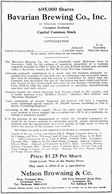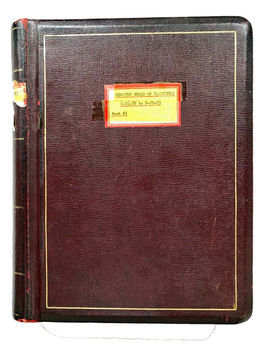
THE BEGINNINGS
- Of Bavarian Brewery
THE BEGINNINGS
- Of Bavarian Brewery
ADS - From Newspapers
CORPORATE MATERIAL
From the Bavarian Brewing Co.
Various corporate documents and internal communications from Bavarian Brewing Co. were obtained, as presented below.
BAVARIAN'S AUDITOR'S REPORT IN 1917
Companies a century ago needed to comply with certain accounting standards and be subject to an auditor's review, in a similar way as they do today. Some of the pages from Bavarian's auditor's report are shown below. The report was dated February 16th, 1918, and reflected operations through the entire calendar year of 1917, with occasional comparisons to the year before. It contains documents that reflect much higher prices for the ingredients use in beer during WWI, and provide an interesting glimpse of the profitability and costs of the brewery at that time. After the cover page, the second document indicates a reduction in the profitability of the brewer from $137,806 in 1916 to $105,187 in 1917. This was primarily attributed to the increased costs of grains and other materials as U.S. entered WWII in 1917, as shown in the third document. It indicates the average cost to produce a barrel of beer increased from $1.97 to $2.92. The inflation occurring at that time was steeper than at anytime in the past century . It represents a cost increase per barrel of beer of about 50%, in just one year. And other prices nearly doubled in a year, such such items as malt, (corn) grits and fuel/supplies. The fourth item provides a breakdown of some of the prices attributable to the inventory on hand. Of interest, is the the listing of the labels, which indicates the brewery produced five beverages: 1) (Riedlin) Select (beer), 2) Bavarian (beer), 3) Bock, 4) Malt Tonic, 5) Ale and 6) Porter. Also of note is that bottles of amber, green and clear were used.
Stock Solicitation
In 1932 a stock offering was proposed to reopen the Bavarian Brewery the following year when Prohibition would be repealed. The cover of this solicitation is shown on the right. This offering was signed by L. S. Deglow, an architect and family member of the original founder, Julius Deglow, as President of the Bavarian Brewing Co. The entire 4-page document is available here. Evidently, this offering was never fully subscribed and the brewery was undercapitalized when it reopened a couple years later in 1935.
BAVARIAN'S OWNERSHIP AFTER PROHIBITION
Capital to operate a brewery was done through direct investments of wealthy individuals or families, but it was also often raised though public or private stock offerings. The smaller breweries that had public offerings were not traded on major exchanges, but simply on curb exchanges and the stock could be purchased at certain investments firms. Raising such funds in the early 1930s after the stock market collapse in October, 1929, would have been challenging. Bavarian was one of several other local Cincinnati breweries that had offered stock in its company in order to reopen after Prohibition.
Stock Certificate
This stock certificate was issued to Murray Voorhees on July 25, 1933, and indicates the brewery was incorporated in Delaware. Interestingly, there was obviously some anticipation to open the brewery before Prohibition ended in 1933, as the corporate seal is dated 1932. However, the brewery didn't open until a couple years after this certificate was issued. When the brewery did open Murrary Voorhees, not Julius Deglow, was President. Apparently, the wife of Murray Voorhees, who was the granddaughter of the brewery's founder, became a major lender and investor in the brewery.
Notices of Stock Available in
Local Cincinnati Breweries
Offering notices for Bavarian Brewing Co. common stock in the summer of 1933 were placed in newspapers in Cincinnati, Indianapolis, Wilmington, DE and other cities. Other breweries were also trying to raise capital at the same time, as shown in one of the ads. The Bavarian offering was considered "speculative" and it was apparently difficult for Bavarian to obtain capital at that time. Please scroll through the notices on the right.
BAVARIAN'S CORPORATE DOCUMENTS
Bavarian Brewing Co. fell into receivership in mid-1937 and was sold out of bankruptcy in December, 1937. The brewery was sold to the son-in-law of the founder, William C. Schott, and three of his brothers, including their family members. These four men served as the initial Board of Directors of Bavarian Brewing Co. Documents that established the Bavarian Brewing Co. under the Schott Brothers are provided below. In addition, the corporate minutes during the operation of the brewery have also been retained.
Articles of Incorporation
After it the brewery fell into bankruptcy, it needed to be incorporated under its new ownership. On the right is a document the certifies the filing of the Articles of Incorporation for Bavarian Brewing Co. by the state Kentucky on January, 26th, 1938. Formerly, the brewer had been incorporated in the state of Delaware. Please view the actual Articles of Incorporation, established a few days earlier on January 21, 1938, or the By Laws, established on January 26, 1938.
For more information about the family that acquired the brewery, please see History: Schott Family Years.
Corporate Minutes
All of the Bavarian Brewing Co. corporate minutes, beginning in January, 1938 and spanning some 21-years, have been retained. The first meeting was to ratify the Articles of Incorporation was on January 21, 1938. It was followed by the first official corporate meeting on January 26th, 1938, when the filing for the corporation was approved by the State of Kentucky. These documents are in four volumes of McMillan TyPoFaX Record Books and were obtained by a relative of the former President of the brewery, William Riedlin Schott. (Volume 1 is shown on the right.) The last corporate meeting was on April 23, 1959, when the merger between Bavarian Brewing Co. and International Breweries Inc. (IBI) was approved by all shareholders and various members of the Schott family. These minutes, accompanied with some budgets and operating statements, were helpful in dating and explaining the history of Bavarian Brewing Co. in the 1940s and 1950s. They provide unique insight into business operations over a decade after World War II and in beginning of the Baby Boomer generation. These minutes are expected to be digitized &/or summarized and available for historical research, upon request.
INTERNAL COMMUNICATIONS
Any corporation has internal documents, manuals, company notices, newsletters, etc.. Below are a few items that were intended for Bavarian's employees.

Bavarian Driver Salesmen-Handbook c. Early 1950s
Bavarian had some over 35 delivery trucks with nearly twice that number in drivers and assistants to deliver Bavarian's beer to taverns and restaurants in Northern Kentucky and the Cincinnati area. In addition, Bavarian hired a number of Distributors to handle distributions especially in Dayton, other parts of Ohio and southern Indiana. However, for their own drivers, Bavarian encouraged their drivers to not only drive safely, but to be salesmen who could provide displays and help increase their deliveries. This encouragement was provided by the aforementioned manual, as well as meetings at the Bavarian Tap Room. Further, Bavarian would recognize a safe driver record of their drivers/salesmen with acknowledgement at an annual dinner meeting, where a pin, to be worn on their delivery hats, would be awarded. This annual "Driver-Helper Safety Award Dinner" was co-sponsored by Bavarian's and Columbia Transportation and was discussed in the "Bavarian's News Tap", pages 6-9, below. Also, please visit Patches and Pins, and to view the contents of the manual cover on the side, please click here.
Group Insurance Program
For Bavarian Brewing Co. Employees
The brewer provided insurance coverage for all of its employees. The accompanying booklet provides the available benefits in 1953 - 1954. To view the contents of this booklet and review health costs at that time, which were so extraordinarily low compared to today, please click here. This particular booklet belonged to William C. Schott, the husband of Lucia Riedlin Schott, and the brewer's Vice President. His son, Lou Schott, was the Personnel Manager and provide a note that accompanied the booklet, as shown. About a year later, Lou was promoted to Secretary / Treasurer of Bavarian, and his brother Wm. R. Schott, became President.
Bavarian's News Tap
A News Bulletin By & For Employees
This periodic publication, which seemed to be at least semi-annually, was prepared by several Bavarian employees. They published "Bavarian's News Tap" to keep employees abreast of brewery changes and events, but mostly to recognize and inform employees about promotions, retirements, awards, marriages, births, anniversaries, athletic accomplishments, trips, hobbies and activities. A cover of three of these publications, one for August, 1956 and the others in June and December, 1957, are shown below. To some extent, these bulletins were the present day equivalent of Facebook. The center bulletin explains the "new look" and the new label for Bavarian/s. The last one introduces plans for the annual Christmas show, featuring both local and national talent. To view the contents of these newsletters select August,1956, June,1957 or December,1957.
Note: The writing on the first two covers is from Lucia Riedlin, the youngest daughter of the founder of Bavarian Brewing Co., Wm. Riedlin Sr. Note: In the June, 1957 News Tap Pages 2&3 and 17&18 are missing.
The Louis L. Schott "New Look" Papers
An assortment of documents used in the process of changing the brewer's logo and label in 1957, were obtained from the grandson of the founder of the Bavarian Brewing Co., Louis Schott. He was also the brewer's Secretary/Treasurer and Marketing Director. These individual documents are listed in chronological order below. This correspondence indicates the tremendous work and effort that went into developing not only a new logo and label for the company's beer at that time, but also a new corporate image. These documents illustrate the collaboration of business efforts mostly in 1957 between the noted brewer, a premier design firm (Lippincott & Margulies) and a renown advertising agency (Calkins & Holden). These design and advertising companies were based in New York City. Also of interest, is that this material illustrates how business was conducted before there were copiers, faxes and overnight shipping, let alone before the Internet, emails and text messages. For more discussion of the efforts and results of this project, please refer to Bavarian's New Look.
1957 (Feb.?) Calkins-Holden New Look Presentation Ideas
1957-2-27 New Look Program Agenda
1957-5-6 Memo to Reduce Stock of Old Label for New Label
1957-5-18 Sales Meeting at Stinton Hotel Plans
1957-5-18 Sales Meeting German Buffet Menu
1957-6-7 L-M Meeting with Bavarian Report
1957-6-12 L-M Architectural and Corporate Image Phase
1957-6-14 To Osler from Bavarian
1957-7-23 New Truck Designs - Osler to Johannes
1957-8-19 Report of CH LM Bavarian Meeting
1957-8-20 Design for Bix Six Case
1957-8-23 Osler to LLS re Big Six
1957-10-2 re logo in Indust Design Mag
1957-11-11 Design of Tavern Signs
1958-1-8 CH LM Bavarian Meeting Report
















